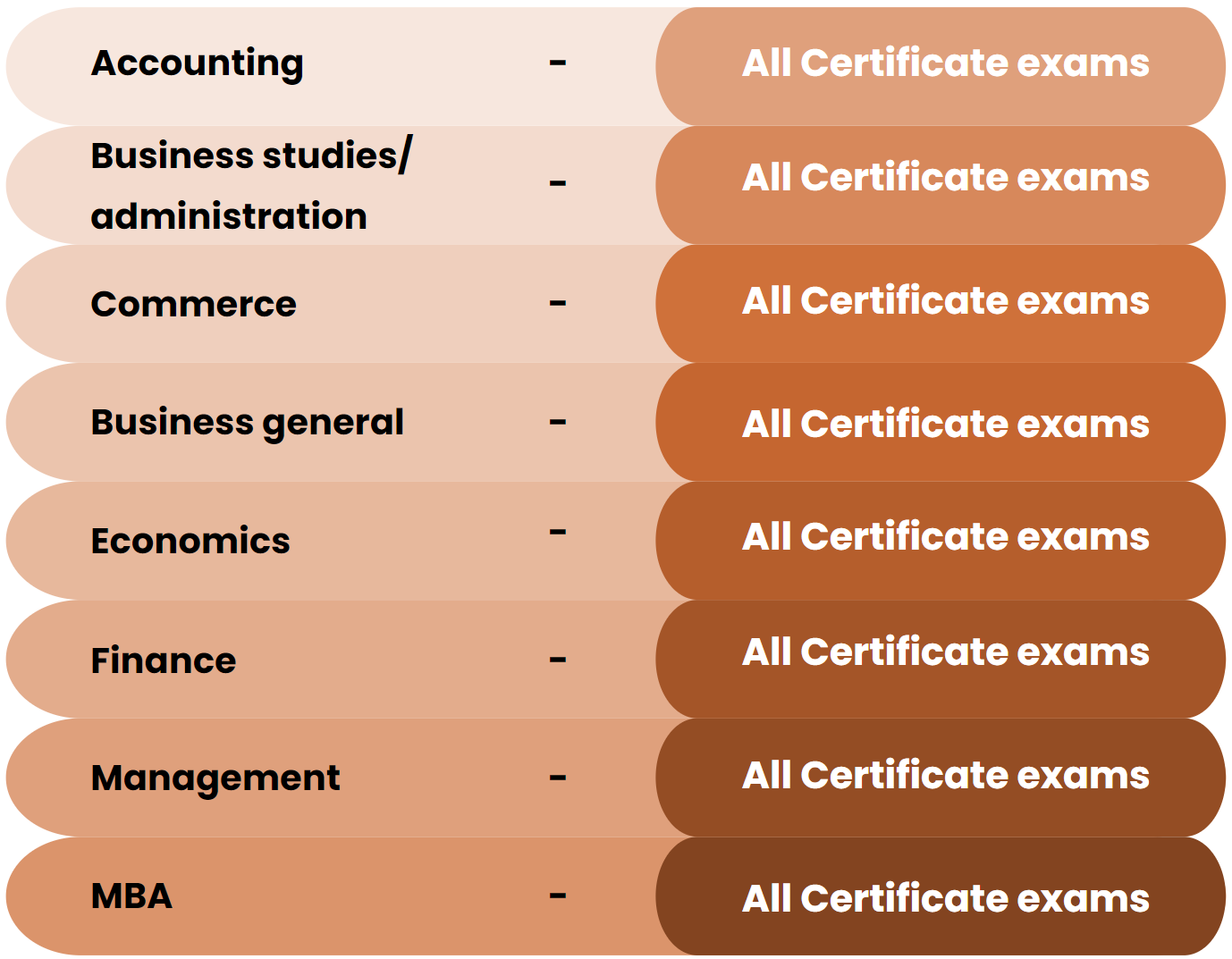CIMA Exemptions in 2025: Why they’re important and how you can get them!

You’re starting your journey with CIMA, and you’re beginning to think about sitting your first exams.
But, before you go any further, you really need to stop and read this ultimate guide to CIMA exemptions, which will give you ALL you need to know to make sure YOU get the exemptions you deserve!
Why CIMA exemptions are a big deal
Which exams could I be exempt from?
What about the Master’s Gateway?
Could the CFO programme be right for you?
Completed the AAT exams? Here’s what you need to know!
I’m a member of another accounting body – do I have any CIMA exemptions?
Tell me if I’m exempt
Help! My qualification isn’t on the database!
I qualify for CIMA exemptions – how do I apply?
So, how much does all this cost?
Is there anything else I need to know?
Why CIMA exemptions are a big deal
So, what exactly are CIMA exemptions?
Well, if you already hold certain qualifications (more on these later!), there may be CIMA exams you don’t need to take. This is because you’ve already proven that you know your stuff.
This is a pretty big deal!
CIMA exemptions can save you time, effort and money, so it’s definitely in your best interest to apply for them if you can.
Get Your Free CIMA Mock Exams
| Access our free CIMA mock exams for each objective test and case study exam when you create your Astranti account! |
Which exams could I be exempt from?
Get Your Free CIMA Mock Exams
| Access our free CIMA mock exams for each objective test and case study exam when you create your Astranti account! |
Which exams could I be exempt from?
The exams you are most likely to get CIMA exemptions for are the four CIMA Certificate Exams. Generally, if you hold a bachelor’s degree in any of these subjects, you are likely exempt from taking the CIMA Certificate exams:

That’s four exams out of the way already!
What about the Master’s Gateway?
That’s graduate qualifications covered, but what if you’ve gone even further and done postgraduate studies? If you’ve got an MBA (Accounting Major) or Master’s in Accounting, you’ll be eligible for exemptions, too!
The route used to be called the Master’s Gateway route, however, this term is no longer being used by CIMA.
Although no longer referred to as the gateway route, technically the exemptions still apply just the same now as they did then.
The route allows you to start your CIMA journey at the management case study exam. Once you’ve passed this, you’ll move on to the strategic level exams. You’ll avoid sitting 11 exams, which can save a lot of time, effort, and money. So you should definitely use this option if you can.
However, a word of warning for potential students entering at this stage…
The pass rate for the gateway exam was historically much lower than the regular management case study pass rate. In the last stats that CIMA published, the pass rate for the gateway exam was just 43%, compared to 68% for students who reached the same exam without CIMA exemptions!
A lot of students who completed the gateway exam failed to give the right level of attention to the theory learned as part of the prior CIMA exams. If you have exemptions to enter at the management case study, it must be stressed that you need to be confident with all of the CIMA theory up to that level if you are to pass.
Therefore, it’s recommended that you start your exam prep with a good chunk of revision before you get to your management case study exam-specific studies.
Could the CFO programme be right for you?
If you’re an experienced chief financial officer (CFO), CEO or senior management professional, CIMA’s CFO programme could be the best of the CIMA exemptions methods for you.
If your application is successful, the CFO programme will fast track your journey straight to the final exam, the Strategic Case Study Exam (SCS).
To apply for the CFO programme you must have:
- 10 years of business experience in business and finance functions
- Not previously failed a CIMA exam
-
If you meet this criteria, here’s what happens next!
- You need to send a detailed copy of your CV to BDC@aicpa-CIMA.com
- Wait to hear if CIMA have accepted you to the CFO programme
- If accepted, you must pay the course fee and take part in the CFO workshop to prepare you for the SCS exam
- Take the SCS exam
- Apply for CIMA membership when you have passed the exam
- You will be awarded your CIMA membership and CGMA and FGMA designations

Completed the AAT exams? Here’s what you need to know!
The most common reason students can get a CIMA exemption is if they’ve sat AAT exams; if you hold an AAT Level 2 or 3 Diploma, you may be exempt from sitting some of the certificate level exams depending on your chosen modules:
Modules that exempt you from BA2:
Unit 8 Performance & Enhancement of value, previously known as Unit 7: Management Of Costs & Enhancement Of Value or Unit 9: Cash Management & Credit Control
Core modules exempt you from BA3
If you hold AAT Level 4: Technician/Diploma, you won’t have to take any CIMA Certificate exams at all!
It’s important to note that the CIMA certificate covers some topics that the AAT syllabus doesn’t, including financial analysis and investments appraisal. So, even if you’re exempt from some CIMA certificate exams, it’s worth looking over the entire certificate level syllabus to check you understand everything before moving on to your next exam.
Wait, I’m already a member of another accounting body – don’t I have any CIMA exemptions?
Yes, you probably do! CIMA recognises a number of accounting bodies for exemptions, such as the ICWAI, ICMAB, or ICMAP.
You should use the CIMA Exemptions search for your institution functions to find out what exemptions you may be eligible for (more on this next!).
Tell me if I’m exempt!
The place to go if you want to find out if you’re eligible for CIMA exemptions is the CIMA website. You can find out more about CIMA’s exemptions and whether you may be eligible in their Eligibility Policy.
But also…
The CIMA exemptions calculator is back!
Great news! CIMA have relaunched their exemptions calculator, and it’s ready for you to use now!
Using this tool will ultimately make the process of checking your eligibility for exemptions 10x easier, however, it must be said that there may still be a chance that you’ll need to speak to CIMA to confirm your exemptions.
Check out the CIMA Exemption Calculator now.
Help! I’m not sure if my qualification is eligible!
Don’t panic! You could still get a CIMA exemption.
CIMA may consider you for certificate exemptions if your qualification is relevant to the course and is equivalent to a UK Certificate of Higher Education (CertHE).
You will need to provide CIMA with the details of your qualification and the awarding body, so they can determine whether you are eligible for exemptions.
If CIMA is unfamiliar with your qualification, there is still a chance of gaining the exemption. In these exceptional cases, they will seek advice from the UK National Recognition Information Centre.
I qualify for CIMA exemptions – how do I apply?
Well done on making the decision to apply for a CIMA exemption – you’re making a smart move! So, let’s get your application underway.
The first step is to follow the exemptions applications process on the CIMA website.
You should then send copies of the certificate and transcript of your qualification (including your module scores) to documents@cimaglobal.com. Remember to include your CIMA ID in your email!

Then you wait…
CIMA should acknowledge your request within 72 hours and will let you know if you’ve been successful in your application within 10-20 working days.
If you successfully gain a CIMA exemption, don’t forget to accept within 4 working days!
So, how much does all this cost?
Nothing!
Once you’ve registered as a CIMA student, there are no extra costs to make a CIMA exemptions application.
Though, as with any CIMA-related fees, we’d recommend checking the CIMA fees page anyway, just to make sure things haven’t changed!
Is there anything else I need to know?
There are a few important points you should note:
- You must have gained your qualification within the last 7 years to be eligible for a CIMA exemption.
- You must apply for CIMA exemptions before sitting the relevant exam. If you take the exam and fail, you will not then be allowed to gain exemption for that exam.
- CIMA only accepts transcripts and certificates in English. If your qualifications are in another language, they must be translated into English by someone who is fluent in both languages and not a member of your family.
For further clarification and more information, you should definitely check out the CIMA Exemptions Policy.

Holly Dymmock
Customer Service and Mentoring Supervisor
I hope you’ve found this guide on taking CIMA exams useful – but if you’ve got any further questions, leave a message and I’d be happy to help!
Comments
Illustration by Storyset.
